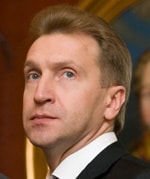Russia
By Simon Watkins
 |
|
Shuvalov: Grand designs for Russia’s currency |
While the rest of the world focuses on the future of the dollar and the euro—and perhaps the renminbi—Russia is hatching a plan that could markedly alter the dynamics of the world’s currency markets. According to Russian first deputy prime minister Igor Shuvalov, the country sees the ruble as a future reserve currency—or even the basis for a regional single currency. Shuvalov recently described the idea of Russia sharing a common currency with Belarus and Kazakhstan as a “logical extension” of the customs union among the three nations that came into effect on January 1 this year.
The three countries are aiming to form an economic union by 2012. With a combined population of around 180 million people and accounting for about 83% of the GDP of the former USSR, the three countries represent a substantial economic bloc. The only hurdle remaining to that plan is the freedom of capital movement—something that would be facilitated by monetary union.
Sam Barden, chief executive officer of SBI Fund Management in Moscow, says, “Although no formal agreements on this idea have yet been reached, [Shuvalov] would look to the introduction of the euro by the European Union as a template.” In order to set the wheels in motion, though, the three nations would have to drastically increase the trade denominated in their own currencies and to re-weight their existing currency reserves further away from the US dollar, says Naheem Majid, managing director of Sinaco Global Trading, in London. Russia has already made moves to address this by denominating some oil deals in rubles and by adding Canadian dollars to its reserves mix.
Much remains to be done—including reducing Russia’s reliance on oil and gas, widening and deepening its financial markets and improving its legal and regulatory frameworks—before the ruble can become a true regional reserve currency or a regional single currency. There is little doubt, though, that Russia wants to enhance its regional influence, and expanding the role of the ruble would help it do so.



